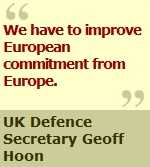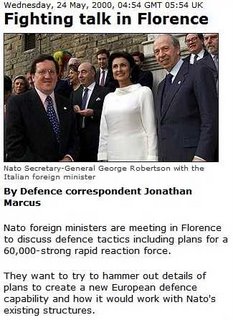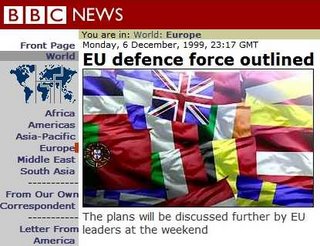 In the face of consistent denials, we have been "banging on" from virtually the moment we started this blog, warning about the steady progress towards the formation of the European Army. Now we have company.
In the face of consistent denials, we have been "banging on" from virtually the moment we started this blog, warning about the steady progress towards the formation of the European Army. Now we have company. Nato Secretary-General Jaap de Hoop Scheffer is warning against "rivalry between the US-dominated alliance and the European Union on security issues", cautioning against engaging in a "beauty contest". According to Reuters, de Hoop Scheffer said they were increasingly competing with each other to win pledges of troops and equipment from stretched national armies. He bemoaned the lack of co-ordination between the two in operations from Afghanistan to Darfur.
Both Nato and the EU are engaged in an unprecedented number of security missions, with the EU running 11 operations from the Democratic Republic of Congo to Aceh in Indonesia, and Nato fielding over 50,000 troops from Afghanistan to the Balkans.
 Nineteen countries are members of both organisations but, says Reuters, there is a split between those led by the United States who see Nato as the fundamental security alliance and others, notably France, who want to build a stronger security role for the EU.
Nineteen countries are members of both organisations but, says Reuters, there is a split between those led by the United States who see Nato as the fundamental security alliance and others, notably France, who want to build a stronger security role for the EU. The diplomatic niceties from a career bureaucrat betray a serious underlying tension that is getting difficult to conceal, more so as yesterday Kurt Beck, leader of the Social Democrats, called for a European army with a single command, the first time a German political party has proposed such a structure.
 This was Beck's first major foreign policy speech since becoming leader of a party that is joined in coalition with Merkel's Christian Democrats, whence he declared that Europe (meaning the European Union) should become a "global peace power" with its own military command and goals.
This was Beck's first major foreign policy speech since becoming leader of a party that is joined in coalition with Merkel's Christian Democrats, whence he declared that Europe (meaning the European Union) should become a "global peace power" with its own military command and goals.If adopted says the International Herald Tribune, this "could lead to the European Union pursuing a security and defence policy independent of Nato."
That Beck should be coming out into the open reflects unease in Germany and elsewhere in Europe about Nato's identification with US leadership. Instead of "following" or "adhering" to the US, Beck argues that Europeans should establish a partnership "based on quality". In the long term, he added, "Europe's security and defence policy would have a single military command."
Nor is this being denied any longer by the EU's own defence think-tank, the Institute for Security Studies in Paris. "Moving toward creating a European armed forces is a work in progress," says Giovanni Grevi, defence analyst. "It should be a serious, constructive and incremental approach. What is at issue is the political control and accountability of those armed forces and the command structure."
 So far, there has been no comment from the UK government, which has consistently denied plans for a European Army, while consistently preparing for one. The proposal has, however, been rejected by President Lech Kaczynski of Poland, who said in Vilnius the EU should build an army of 100,000 that would remain linked to Nato.
So far, there has been no comment from the UK government, which has consistently denied plans for a European Army, while consistently preparing for one. The proposal has, however, been rejected by President Lech Kaczynski of Poland, who said in Vilnius the EU should build an army of 100,000 that would remain linked to Nato.Today he meets prime minister Tony Blair, ostensibly to discuss diversifying energy supplies and the future of the EU constitution but, doubtless, the Nato-EU friction and the Beck statement will be discussed. The question remains though whether Blair will continue in denial mode or himself come out in the open.
Either way, be under no illusion. The "colleagues" mean to have their army, and will bring down Nato in the process of creating one. De Hoop Scheffer is not sounding the alarm for nothing.
COMMENT THREAD
No comments:
Post a Comment
Note: only a member of this blog may post a comment.